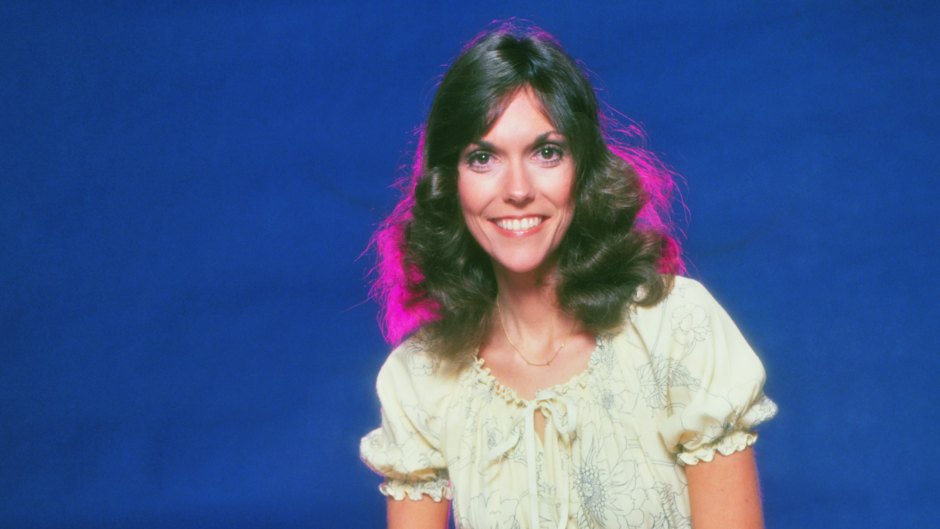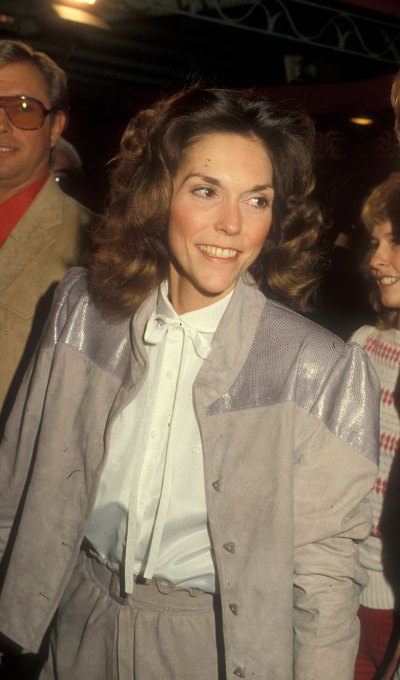
Harry Langdon/Getty Images
Karen Carpenter Was ‘Taking Treatment Seriously’ Amid Anorexia Battle Before Death at 32
Karen Carpenter enjoyed testing the limits of her beloved 1979 Jaguar XJS. “She loved to drive up the highway being chased by fans,” biographer Lucy O’Brien exclusively shares with Closer.
As one half of the Carpenters, Karen’s honeyed voice and wholesome image made her a superstar in the 1970s. Despite the greatness of the music she left behind, her premature death at age 32 from the complications of anorexia would always color her story with sadness and unfulfilled promise. A new biography seeks to change the tenor of her tragedy. “She’s been presented as a fragile person and a victim,” says O’Brien, author of Lead Sister: The Story of Karen Carpenter. “But I got a sense of a woman who was very driven, pioneering and quite stubborn. She was not a shrinking violet.”
Karen grew up very close to her brother, Richard, who was slightly more than three years older. Like two sides of the same coin, they shared similar opinions on nearly everything. “We were almost like male-female clones. The smiles were identical, and we liked and disliked the same things — not just music: comedians, movies, just about everything,” revealed Richard in 2021’s Carpenters: The Musical Legacy.
Their parents tried to be encouraging of their dreams. When Karen asked for a professional drum kit as a teenager, they purchased it for her though females rarely played drums in the 1960s. “She learned to play exotic time signatures immediately,” Richard tells Closer. “She just got it.” But despite Karen’s natural talent, their mother’s highest praise was reserved for Richard, who had shown signs of being a piano prodigy from a very young age. “Her mother was very dominant and looked on Richard as the musical genius,” says O’Brien. “I think Karen felt overlooked at times.”
But not always. Agnes Carpenter likely assumed she was helping her 17-year-old daughter when she took her to a diet doctor. “You could argue that was the beginning of Karen’s obsession with counting calories and watching her weight,” says O’Brien.
Richard confesses that he knew he and Karen were onto something as the Carpenters. They signed their first record contract in 1969. “I believed in Karen as a singer, myself as an arranger, and the two of us as a sound,” says Richard. “My proudest accomplishment is ‘Close to You.’” Dionne Warwick previously released a version of this Burt Bacharach/Hal David classic, but it would become the Carpenters’ breakthrough hit in 1970 — and arguably the definitive version of the song.
After “Close to You,” everything happened very fast. “We were an overnight sensation,” says Richard, who was put on whirlwind, near constant tours with Karen. “We were headlining Vegas a little over a year from when we hit.”

The pressure took a toll on both of them. “When you’re on the road, it’s hard to eat. Period. On top of that, it’s rough to eat well,” said Karen, who after seeing unflattering photos of herself doubled down on dieting. “As the Carpenters became famous, she was more self-conscious,” says O’Brien, who pinpoints 1975, when Karen was hospitalized, as the start of her decline. “From then on, it was about periods of recovery. She was really in the grip of anorexia, and it became more chronic each time she relapsed.”
The unyielding schedule also impacted Richard, who began taking Quaaludes to help him sleep and wound up addicted. He took a break from performing in 1979 to address his health. “Karen really should have been taking time off to get herself well, too,” says Chris May, co-author of Carpenters: The Musical Legacy. “But when Karen was struggling with something, she threw herself into her work.”
There were other heartbreaks: Karen’s solo album, recorded while Richard was on leave, was judged unreleasable by her record company. “She had invested $400,000 of her own money,” says O’Brien. “It was devastating. She felt very rejected after that.”
Turning her attention to her personal life, Karen wed Thomas Burris, a real estate developer, after a whirlwind romance in 1980. It was a mistake. “He was very good at spending her money, and the marriage was short-lived,” says O’Brien. “I think when that marriage failed, that was part of what sent her into a real tailspin.”
After her first collapse, Karen tried different therapies to deal with her anorexia, which was not yet treated as a life-threatening illness by the medical profession. “Karen thought she could beat it by willpower alone,” explains O’Brien, who adds that anorexia became like an addiction for the singer. In addition to severe calorie restriction, Karen exercised compulsively, took a thyroid medication to speed up her metabolism and abused laxatives.
Still, when she arrived back in California a few pounds heavier after months of therapy with a New York psychotherapist, she felt hopeful. “Karen would say that she was going to beat this,” says O’Brien. “She was taking treatment seriously.”
Karen met with Richard to talk about the Carpenters a few days before she went into cardiac arrest at her parents’ home and died on February 4, 1983. “Her story is really tragic and really sad, but she did her best,” says O’Brien. “I think she would say that it was the music that really mattered the most.”







































